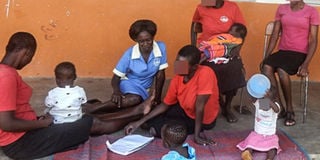4,900 girls impregnated in two years, says survey

Care. Teen mothers attend to their children at Pader Girls’ Academy, Pader District, in April 2018. A new report indicates that there is a high teenage pregnancy rate in Apac and Kwania districts. PHOTO BY BILL OKETCH.
What you need to know:
Reason. The survey attributes cases of early marriage and teenage pregnancy to poor parenting and greed for dowry.
A total of 4,969 girls aged between 12 and 17 were impregnated in 2017 and 2018 in Apac and Kwania districts.
A report released last week titled: ‘The Baseline Survey on the Rate of Teenage Pregnancy and Child Marriage’, indicates that poor parenting coupled with greed for dowry has been blamed for the rampant cases of early marriages and teenage pregnancies.
At least 2,489 of the impregnated young girls were either married off or had given birth in the sub-counties of Akokoro, Ibuje, Nambieso, Chawente and Abongomola.
The report further shows that 13 cases of teenage marriages were stopped in Apac between January and June this year.
The survey conducted by Communication for Development Foundation in Uganda (CDFU), a non-governmental child rights organisation, in different health facilities, also established that 2003 girls attended their first antenatal care in 2017.
Other 2,966 children sought antenatal care services in 2018.
Mr David Okeng, the programmes manager of CDFU while releasing the report in Apac Town, blamed the escalating teenage pregnancy problem on negligence by members of the community who gain from the vice.
“Some parents are forcing their children into marriage because they are money hungry, they don’t want to pay school fees for their children but accept dowry,” Mr Okeng said.
He called upon political, religious and cultural leaders to join hands in the fight against teenage pregnancy.
“Local and cultural leaders should open their eyes and condemn this marriages so that we can save the future of our children. It is some of these leaders who are officiating child marriages,” he added.
The Apac District speaker, Mr Emmanuel Okello Ecun, last year said his daughter was a victim of teenage pregnancy.
“Somebody just impregnated my daughter who by then was in Senior Two. The school learnt of it two weeks ago [then] and I was called to go and pick her. I have been counselling her at home,” he said.
However, the officer-in-charge of Apac Central Police Station, Mr Kalifan Chemutai, blamed some parents for frustrating police efforts in prosecuting suspected offenders of defilement and child marriages.
“It may be reported today and tomorrow but they (parents) come back with a different issue after they have negotiated the matter from home,” Mr Chemutai said.
He said any negotiation should be done at office of the Director of Public Prosecutions.
Mr Isaac Okao, the Apac District probation officer, said the department is facing difficulties in combating teenage marriages because of lack of funds.
“Child marriages require someone to go to the ground and face the problem before it goes far but our budget is also very slim, sometimes we may not afford to go in time,” Mr Okao said.
Health implication
Dr Richard Nam, a gynaecologist, said early pregnancy exposes the mother and the baby to both health and social dangers.
“At early age, the bones in the waist, which are to deliver the baby will not have got matured. So if one is to get pregnant when the bones are not yet mature, she will be forced to push the baby through the bones,” he said.
He added: “The womb is likely to break and the baby may also die resulting to the loss of both the baby and the womb. It can also puncture the urinary bladder and damage the rectum causing uncontrolled passing of urine and stool commonly known as fistula.”
CASES OF DEFILEMENT AND TEENAGE PREGNANCY
Data obtained from Apac Central Police Station indicates that between April and May 2019, 22 cases of defilement were reported to police in Apac. Two offenders were convicted, 15 cases were prosecuted, three cases are still under inquiries and two cases are under investigations.
The Uganda Demographic and Health Survey 2016 showed that teenage pregnancy rate in northern Uganda was at 145 per 1,000 girls.
The survey summarised that about 61 per cent of Ugandan children below the age of 18 years had been married or were living in some form of union.




